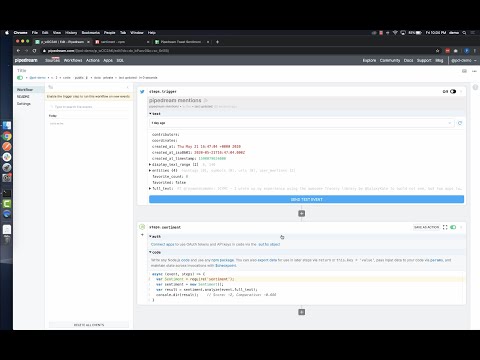What do you want to automate
with Google Sheets and Emailoctopus?
Prompt, edit and deploy AI agents that connect to Google Sheets, Emailoctopus and 3,000+ other apps in seconds.
Trusted by 1,000,000+ developers from startups to Fortune 500 companies
Popular Ways to Connect Google Sheets with Emailoctopus#
Popular Google Sheets and Emailoctopus Triggers#
Popular Google Sheets and Emailoctopus Actions#
Add a single row of data to Google Sheets. Optionally insert the row at a specific index (e.g., row 2 to insert after headers, shifting existing data down). See the documentation
Add multiple rows of data to a Google Sheet. See the documentation
Get all values or values from a range of cells using A1 notation. See the documentation
Overview of Google Sheets#
The Google Sheets API allows for the creation, reading, updating, and deletion of data within Google Sheets, enabling a robust platform for spreadsheet management and data manipulation. Through Pipedream, you can craft serverless workflows that respond to various triggers, such as webhook events, emails, or scheduled times, to interact with Google Sheets. This synergy can automate reporting, synchronize data across applications, manage inventory, track leads in a CRM, or even conduct survey analysis by updating and retrieving sheet data on the fly.
Connect Google Sheets#
import { axios } from "@pipedream/platform"
export default defineComponent({
props: {
google_sheets: {
type: "app",
app: "google_sheets",
}
},
async run({steps, $}) {
return await axios($, {
url: `https://www.googleapis.com/oauth2/v1/userinfo`,
headers: {
Authorization: `Bearer ${this.google_sheets.$auth.oauth_access_token}`,
},
})
},
})
Overview of Emailoctopus#
EmailOctopus is a cost-effective email marketing tool that lets you send emails and manage subscribers with ease. Using the EmailOctopus API on Pipedream, you can automate subscriber management, trigger email campaigns based on various actions, or synchronize your marketing efforts across different platforms. The API's capabilities facilitate a wide range of marketing workflows, from auto-updating mailing lists to sending targeted emails when specific conditions are met.
Connect Emailoctopus#
import { axios } from "@pipedream/platform"
export default defineComponent({
props: {
emailoctopus: {
type: "app",
app: "emailoctopus",
}
},
async run({steps, $}) {
return await axios($, {
url: `https://emailoctopus.com/api/1.5/lists`,
params: {
api_key: `${this.emailoctopus.$auth.api_key}`,
},
})
},
})
Related Videos#



Community Posts#


